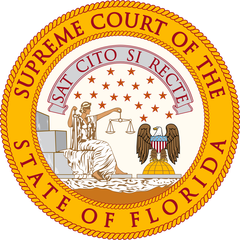From a legal perspective, Florida is divided into regions or “districts” that have mid-level review courts (appeals courts) set up to oversee and review the decisions and determinations of lower trial courts. The Florida Supreme Court sits as the highest court in the state, and its job is to oversee these reviewing courts in the various districts.
Not every case goes “up on appeal” after it is tried. Not every case that is reviewed “on appeal” by the District Court of Appeal continues up to the Florida Supreme Court for additional review.
There are many reasons for this. Parties settle. One of the parties may not have the money to continue the fight via appellate review. And, especially for the High Court, not every case that is submitted for review is determined worthy of the court’s time.
The Florida Supreme Court only takes cases in certain circumstances. For instance, the high court may hear a case where an one appellate court decision directly conflicts with the decision of another appellate court, including decisions that an appellate court certifies to be in conflict with an opinion of another appellate court.
In those instances of a “conflict between the circuits,” the law decided by that region’s appeals court should be the law that is applied in that district until the Florida Supreme Court deems otherwise.
It’s a big deal when a legal issue makes its way to the Florida Supreme Court. And right now, every Florida home owner dealing with a foreclosure and a deficiency judgment should be aware of the conflict that is happening up in Tallahassee between banks and foreclosure defendants. Here’s the issue:
What is The Important Conflict in Florida Foreclosure Law to Be Decided By Florida Supreme Court?
Today, Florida foreclosure law is one thing in the Fifth District Court of Appeal and another in the Third Circuit Court of Appeal. It’s a an important issue because the conflict allows for two different interpretations of whether a bank can re-file a foreclose on a homeowner, with the answer currently depending upon which part of the State of Florida the property is located.
That’s not fair; right? Which is why the Florida Supreme Court has taken this matter up on review. Some time in the near future, homeowners will be provided with an answer.
1. Deutsche Bank Trust Company Americas v Beauvais, Case No. 3D14-575 (Fla. 3rd DCA, December 17, 2014).
Last week, the Third District was asked if a bank can file a new Florida foreclosure lawsuit (”cause of action”) after there has been an involuntary dismissal of its first foreclosure action without prejudice (and after there has been an acceleration of payments) based upon a subsequent default.
The Third District Court of Appeals says NO. Read the case here.
According to that appeals court, if the bank accelerated the debt regarding that first foreclosure lawsuit and there was an involuntary dismissal of that first filed foreclosure suit, the debt is still accelerated and the date of the bank’s acceleration begins the time ticking on the statute of limitations for that bank to file its foreclosure action. If the bank doesn’t file for foreclosure before that limitations period ends, then it’s time barred from doing so under Florida law.
Did the Third Circuit know about an earlier decision made by its sister court, the Fifth District? Yes.
2. U.S. Bank Nat. Ass’n. v Bartram 140 So.3d. 1007 (Fla. 5th DCA, 2014), rev. granted (September 11, 2014).
In the Beauvais decision, the Third Circuit recognized the Fifth Circuit’s decision in Bartram as well as a decision made by the Fourth Circuit in Evergrene Partners, Inc. v CitiBank, NA, 143 So.3. 954, 956 (Fla. 4th DCA 2014).
The Third Circuit disagreed with the perspective of the 4th and 5th DCA courts and said that the statute of limitations began to run once the mortgage was accelerated (technically speaking, the 3rd DCA said that the statue of limitations law in a bank foreclosure is the same as that of “res judicata”, which is where an issue can’t be revisited because it was already decided).
For a discussion of the Bartram case particulars, see our earlier post, “Can a Florida Bank File a New Foreclose Lawsuit 5 Years After Your Case Was Dismissed? When is a Florida Bank Foreclosure Lawsuit Barred by the Statute of Limitations?”
What Does This Mean For Florida Homeowners and Foreclosure Defense Attorneys?
Right now in Florida, in those cases where 5 years or more has passed since the bank first accelerated the debt and the bank’s previously filed foreclosure action was dismissed without prejudice, the Beauvais decision by the Third District provides a legal argument that any new foreclosure lawsuit is TIME BARRED. It’s an argument that should be made right now by foreclosure defense attorneys while the Florida Supreme Court is considering the conflict between the appellate courts; the Third District’s ruling may well turn out to be the law of the state. So, stay tuned!

Do you have questions or comments? Then please feel free to Chat with Larry in the comments below, at info@hallandalelaw.com, or (954) 458-8655. If you have a specific or personal situation, please call or email Larry because he can’t answer specific fact questions in general comments.


